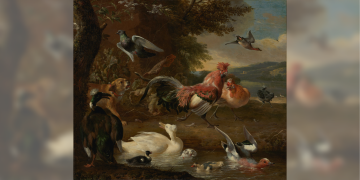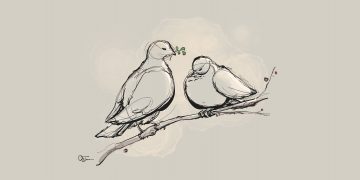Dear friend of mine,
Singleness has never really appealed to me. Perhaps because I have all these big life questions, and my whole world tells me that marriage is the answer.
What I want from life is connection, but I’m told that singleness is for those who want independence instead. In my singleness, can I still live a connected life, not lacking in fullness or richness of intimacy?
Will my friends stay with me when they get married themselves and not leave me behind? When my parents are no longer around, will I still be in good company? Will I always have a family of sorts by my side in this world, no matter how long the years of my life end up being?
Has my life already started in earnest, so that I can begin living life with all the intentionality that I have been waiting to employ? Will I find, if I never marry, that I still have truly lived?
Finding Answers
The answer I have found to all of these is a resounding yes.
Yes, we can be single and lack nothing in connection and intimacy.
Friendships can thrive despite life’s many challenges, even if they might take new forms as we all grow into new stages of life. We can still truly belong with our communities and be at home, even when there are no blood or marital ties to bind us.
And yes, we can already live life abundantly, with all the dignity and significance afforded to a full human being, and that isn’t something contingent on marital status or having a significant other.
These answers comfort me, and I hope they comfort you too. But I’ll have to be honest and say that’s not the full story – finding these answers weren’t enough. There’s a deeper need that was still not satisfied.
“Then the Lord God said, “It is not good that the man should be alone; I will make him a helper fit for him.”” (Genesis 2.18)
In my search for those earlier answers, I came across endless debates on whether Genesis 2 means that marriage is the norm and singleness is the unfortunate exception, or whether 1 Corinthians 7 (“… it is good for them to remain single, as I am. But if they cannot exercise self-control, they should marry.”) means that singleness is the ideal and marriage is a reluctant compromise for the weak, lest they “burn with passion”.
What I really should have paid attention to is the need that started it all: “it is not good for man to be alone.”
The answers I found helped me learn to be content, but I had failed to learn to not be lonely. There is a primal need for companionship in all of us, running deeper than just singleness or any relational status, because we were made in God’s image to be in community and to not be alone. This need requires addressing, and it takes more than a handful of answers to do so.
The Deep Need for Companionship
If marriage is a good thing, it was created in response to this need. And Jesus, though He did not participate in the human institution of marriage Himself nor fussed about the marital status of His disciples, certainly did care for their need for companionship. John in his gospel paints Jesus not just as a Teacher he followed, but also as a Lord he loves – and whose love he knew intimately, calling himself “the disciple whom Jesus loved.”
This need for companionship is larger than what any one person can ultimately fulfill, and will outlast any dating relationship or marriage we may have in our lifetime. Though we don’t like to think about it, breakups and separations happen, and even spouses outlive one another. Our need for companionship however, stays with us as we continue to live and breathe.
This need for companionship is larger than what any one person can ultimately fulfill, and will outlast any dating relationship or marriage we may have in our lifetime. Though we don’t like to think about it, breakups and separations happen, and even spouses outlive one another. Our need for companionship however, stays with us as we continue to live and breathe.
In this way, though we all find ourselves in different boats relationally – single, dating, married, divorced, or widowed – we are all actually weathering the same storm of wanting to love and be loved in a broken, fallen world. The single person is just like the married person in this way.
Where does that leave us? Forever students, learning in the ways of love. Always learning to tend to our need for companionship, just as we do with other needs we have on this side of Heaven like hunger and rest, and hopefully getting better at it. Otherwise, it will be too easy for a single person to idolize romantic relationships, or for a dating or married person to idolize their partner as the ultimate remedy for their deeper need for companionship. Relationships are God-given, all good and well, but it is a cruel and terrible burden to heap it all on one person – no matter spouse or friend.
Walking with Our Need
Learning to walk in the ways of love is a lifelong journey with much for us to learn, but if nowhere else, start here: learn to receive love. Add this to the repertoire of the life skills you’ll need. Learn to be gladdened by the company of your friends. Learn to be comforted by the company of your God. And if you already are, then more, more truly, and more deeply. Really ask questions like, “what does it look like to receive the love and companionship of a God I cannot see?” and embark on the journey to find out. Let your senses be opened to all the love letters He has surrounded you with in a busy, distracted world. And do the same with your friends. It will not surprise you when you realize that receiving their love genuinely is also how you love others well.
Learning to walk in the ways of love is a lifelong journey with much for us to learn, but if nowhere else, start here: learn to receive love.
It seems apt to then end on the greatest commandment:
“And he said to him, “You shall love the Lord your God with all your heart and with all your soul and with all your mind. This is the great and first commandment. And a second is like it: You shall love your neighbor as yourself.” (Matthew 22.37-39)
Perhaps it is called the greatest commandment because it is the greatest answer to our greatest need; when we love one another, we take part both in receiving that greatest answer from others, and in becoming that greatest answer for them. And we can do it all because of how God loves us and how we love Him in response, for “we love because he first loved us” (1 John 4.19).
Perhaps it is called the greatest commandment because it is the greatest answer to our greatest need; when we love one another, we take part both in receiving that greatest answer from others, and in becoming that greatest answer for them. And we can do it all because of how God loves us and how we love Him in response, for “we love because he first loved us” (1 John 4.19).
If you take nothing else from my ramblings today, here are all the things I wish for you to know:
- Understand that the deep relational pain you are experiencing stems from an even deeper need for companionship that we all have, and will continue to have, single or married. We all don’t want to be alone, and we all face the same struggle of wanting to love and be loved in a fallen and broken world.
- Accept that it’s a lifelong journey. Learn to receive the answer to this need for companionship, both from God and from people (from me too), single or married. Your capacity to feel loved by us will affect how well you can love others. Like any life skill, it will take time to develop, but it won’t be a waste. Oh, and that’s both God and people – not one without the other.
- Lastly, know that I’m holding up today because I have received such love that answers my need for companionship from you. And from God, who in His love has put you in my life. I needed you and you were there. It’s the big things and it’s the little things. I want you to know that you have been a good friend. And if I love you dearly and want you to feel loved by me on account of our friendship, I can only imagine how much more God loves you.
Understand that the deep relational pain you are experiencing stems from an even deeper need for companionship that we all have, and will continue to have, single or married … Accept that it’s a lifelong journey. Learn to receive the answer to this need for companionship, both from God and from people.
With much love,
This friend of yours































































